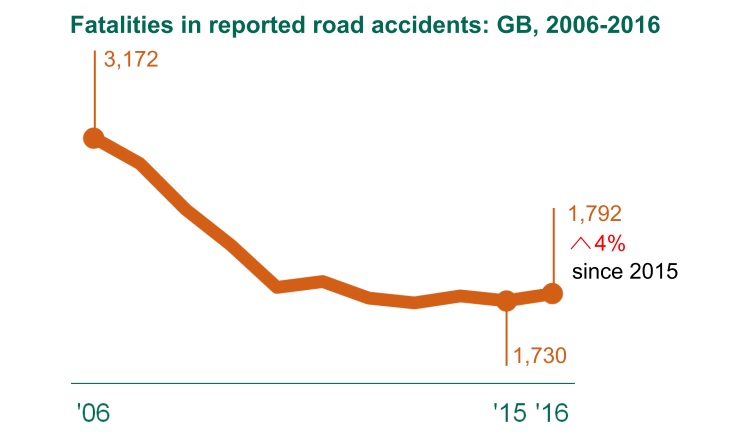The London Road Safety Council (LRSC) has expressed concern that changes to the way road casualty and collision data is collected and recorded in the Capital will make it virtually impossible for the data to be meaningfully compared to many other parts of the country.
Published yesterday (29 Sept), the DfT statistics show there were 1,792 reported road deaths in 2016, a year-on-year rise of 4%.
Although the figure represents the highest annual road deaths total since 2011, the DfT describes the increase as ‘statistically insignificant’ and says ‘it is likely that that natural variation in the figures explains the change’.
The total number of serious injuries also rose to 24,101. However, because of the aforementioned change in the reporting system used by some police forces, the DfT says this figure should not be compared to previous years.
Approximately half of English police forces adopted the CRASH (Collision Recording and Sharing) system for recording road traffic collisions at the end of 2015, or the early part of 2016.
In addition, the Metropolitan Police Service switched to a new reporting system called COPA (Case Overview Preparation Application) from September 2016.
With CRASH and COPA, the police officer records the type of injuries suffered by the casualty rather than the severity (severity is measured simply as ‘slight’ or ‘serious’).
Under other systems, police officers need to determine themselves which injury type classifies into each of the two severity types.
CRASH and COPA are designed to eliminate any uncertainty that arises from the officer having to use their own judgement – and therefore be more accurate.
Mark Bunting, LRSC’s press officer, said:
“The LRSC is concerned that the changes to the way road casualty and collision data is collected and recorded in London will make it virtually impossible for London’s data to be meaningfully compared to that from many other parts of the country.
“In London the Met Police are now using the new COPA system and about half of the police forces outside London switched to a new system called CRASH.
“These new systems calculate the severity of injury rather than it being entered by the police officer, which appears to have led to a significant increase in the number of casualties recorded in the ‘serious injury’ category.
“In London, data for November and December 2016 – the first two months in which data has been recorded using the new system – shows an alarming increase in the number of casualties recorded as sustaining serious injuries.
“During this period there was a total of 5,901 casualties recorded in London, a 15% increase on the same period in 2015 (5,116).
“However, when recorded casualties in the serious injury category are isolated, they show an increase from 355 during this period in 2015 to 606 in 2016, a massive 71% increase.
“Further investigation may show that the new systems are giving a truer representation of serious injury numbers, but with half of the police forces using the old system and half the new it, it is now impossible to meaningfully compare data from across the country.
“This needs to be rectified at the earliest possible opportunity.”
29 September 2017

